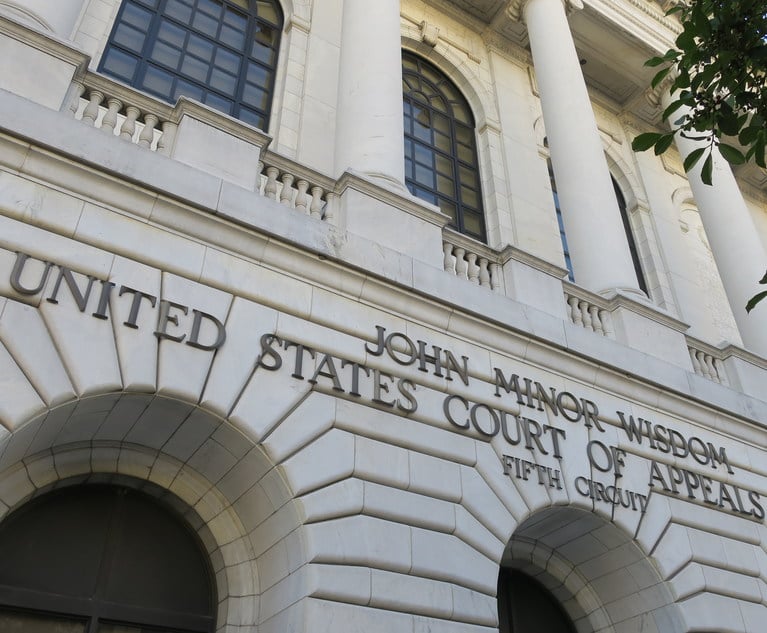Trump's Tweets, Kennedy & More: What to Watch at Travel Ban Arguments
Four things to watch Wednesday morning when the justices take up argument over the Trump administration's travel ban. Trump's said a lot about the ban. How much will his words matter?
April 24, 2018 at 06:05 PM
5 minute read
 A large crowd rallies in January 2017 against President Donald Trump's order banning immigration from seven Muslim-majority countries. Photo: Diego M. Radzinschi/ALM
A large crowd rallies in January 2017 against President Donald Trump's order banning immigration from seven Muslim-majority countries. Photo: Diego M. Radzinschi/ALM
Call it a case that has everything: religion, immigration, national security, separation of powers, nationwide injunctions and even the president's tweets. All of this comes together in Trump v. Hawaii, the final argument of the U.S. Supreme Court term.
The justices on Wednesday morning will examine the constitutionality and legality of President Donald Trump's third iteration of the so-called travel ban, which blocks the entry of foreign nationals from six predominantly Muslim countries.
The Sept. 27 ban originally applied to eight countries: Iran, Libya, Syria, Yemen, Somalia, Chad, North Korea and Venezuela. Chad was recently removed from the list and replaced by Sudan. The challengers have not appealed the ban's application to North Korea and Venezuela.
Here are four things to watch at Wednesday's oral arguments:
|Trump's said a lot about the ban. How much will his words matter?
What will the justices say about Trump's statements and tweets on the travel ban? The challengers, represented in the arguments by Hogan Lovells partner Neal Katyal, claim a “litany of statements” by Trump and his administration from the presidential campaign to weeks after the ban was issued demonstrate the “unconstitutional purpose of excluding Muslims from the United States” because of their religion. They note as well Trump's retweets of three anti-Muslim videos.
Defending the ban, U.S. Solicitor General Noel Francisco counters that relying on such statements “represents precisely the sort of 'psychoanalysis of' a government official's 'heart of hearts' that the justices have rejected.”
|What most interests Roberts and Kennedy?
During his tenure on the court, Chief Justice John Roberts Jr. has taken a special interest in structural issues in the Constitution: which branch has the power to do what. The first issue confronting the court is whether the judiciary has the authority to even review the travel ban. That is a core separation-of-powers issue tailor-made for the chief. And so too is a second key question: did Trump exceed his authority under the Constitution and immigration law by issuing the travel ban?
Justice Anthony Kennedy may well home in on a third issue: Does the travel ban violate the First Amendment's establishment clause? Kennedy has written extensively on the religion clauses and his concern with individual dignity may figure into his questions during the arguments.
|Will the ghost of the Supreme Court's Korematsu decision appear?
In a powerful amicus brief on behalf of the children of Fred Korematsu, Gordon Hirabayashi and Minoru Yasui, Pratik Shah, a partner in Akin Gump Strauss Hauer & Feld, reminds the justices of the history of the Japanese-American internments during World War II and sees in the government's travel ban arguments a “disturbing similarity” to the arguments the justices accepted in the internment cases.
“By refusing to scrutinize the government's claim that its abhorrent treatment of Japanese Americans was justified by military necessity, the court enabled the government to cover its racially discriminatory policies in the cloak of national security,” Shah wrote.
The amicus brief urges the justices to heed the lessons of history and to give “meaningful judicial scrutiny” to Trump's decision to issue the travel ban. It also calls on the court to acknowledge “the historic wrong” in the Korematsu, Hirabayashi and Yasui cases and to “repudiate” the court's refusal to scrutinize the government's claim of necessity.
Katyal, serving in 2011 as the acting U.S. solicitor general, addressed the “mistakes” the government made in defending Japanese-American internment at the Supreme Court. A statement posted on the Justice Department's website was presented as a “confession of error.”
|The power of the amicus: Will one brief stand out?
The 72 amicus briefs filed in the case are not a record number in Supreme Court cases, but they are notable. More than half support the challengers. Some of the justices in recent arguments have mentioned particular amicus briefs as raising important arguments.
In McDonnell v. United States, Roberts cited an amicus brief by former White House counsel to five presidents. And an amicus brief by military officers played an important role in Justice Sandra Day O'Connor's affirmative action decision in Grutter v. Bollinger.
There obviously is a wealth from which to choose on both sides. For example, the government argues that national security is the principal purpose of the travel ban. Yale Law School's Harold Koh attacks that claim in an amicus brief by a bipartisan group of 52 former government national security and intelligence officials. The Becket Fund for Religious Liberty takes a different position on the religious discrimination issue, arguing that the religious targeting claim should be evaluated under the free exercise clause, not the establishment clause.
Read more:
This content has been archived. It is available through our partners, LexisNexis® and Bloomberg Law.
To view this content, please continue to their sites.
Not a Lexis Subscriber?
Subscribe Now
Not a Bloomberg Law Subscriber?
Subscribe Now
NOT FOR REPRINT
© 2025 ALM Global, LLC, All Rights Reserved. Request academic re-use from www.copyright.com. All other uses, submit a request to [email protected]. For more information visit Asset & Logo Licensing.
You Might Like
View All
4th Circuit Revives Racial Harassment Lawsuit Against North Carolina School District
3 minute read
Legal Issues to Watch in the US Appeals Courts in 2025

Second Circuit Upholds $5M Judgment Against Trump in E. Jean Carroll Case
4 minute read
Divided 5th Circuit Shoots Down Nasdaq Diversity Rules
Trending Stories
- 1Thinking Outside the RFP: AI’s Impact Beyond Scaling Review Efficiency
- 2Special Series Part 4: The Statutory Guardrails Impermissibly Bind Future Legislatures
- 3New York Court of Appeals Blocks Trump Attempt to Stay Friday Sentencing
- 4'Self-Diagnosed Nickel Allergy' Fails to Find Success in Med-Mal Suit, 8th Circuit Rules
- 5Eversheds Sutherland Adds Hunton Andrews Energy Lawyer With Cross-Border Experience
Who Got The Work
Michael G. Bongiorno, Andrew Scott Dulberg and Elizabeth E. Driscoll from Wilmer Cutler Pickering Hale and Dorr have stepped in to represent Symbotic Inc., an A.I.-enabled technology platform that focuses on increasing supply chain efficiency, and other defendants in a pending shareholder derivative lawsuit. The case, filed Oct. 2 in Massachusetts District Court by the Brown Law Firm on behalf of Stephen Austen, accuses certain officers and directors of misleading investors in regard to Symbotic's potential for margin growth by failing to disclose that the company was not equipped to timely deploy its systems or manage expenses through project delays. The case, assigned to U.S. District Judge Nathaniel M. Gorton, is 1:24-cv-12522, Austen v. Cohen et al.
Who Got The Work
Edmund Polubinski and Marie Killmond of Davis Polk & Wardwell have entered appearances for data platform software development company MongoDB and other defendants in a pending shareholder derivative lawsuit. The action, filed Oct. 7 in New York Southern District Court by the Brown Law Firm, accuses the company's directors and/or officers of falsely expressing confidence in the company’s restructuring of its sales incentive plan and downplaying the severity of decreases in its upfront commitments. The case is 1:24-cv-07594, Roy v. Ittycheria et al.
Who Got The Work
Amy O. Bruchs and Kurt F. Ellison of Michael Best & Friedrich have entered appearances for Epic Systems Corp. in a pending employment discrimination lawsuit. The suit was filed Sept. 7 in Wisconsin Western District Court by Levine Eisberner LLC and Siri & Glimstad on behalf of a project manager who claims that he was wrongfully terminated after applying for a religious exemption to the defendant's COVID-19 vaccine mandate. The case, assigned to U.S. Magistrate Judge Anita Marie Boor, is 3:24-cv-00630, Secker, Nathan v. Epic Systems Corporation.
Who Got The Work
David X. Sullivan, Thomas J. Finn and Gregory A. Hall from McCarter & English have entered appearances for Sunrun Installation Services in a pending civil rights lawsuit. The complaint was filed Sept. 4 in Connecticut District Court by attorney Robert M. Berke on behalf of former employee George Edward Steins, who was arrested and charged with employing an unregistered home improvement salesperson. The complaint alleges that had Sunrun informed the Connecticut Department of Consumer Protection that the plaintiff's employment had ended in 2017 and that he no longer held Sunrun's home improvement contractor license, he would not have been hit with charges, which were dismissed in May 2024. The case, assigned to U.S. District Judge Jeffrey A. Meyer, is 3:24-cv-01423, Steins v. Sunrun, Inc. et al.
Who Got The Work
Greenberg Traurig shareholder Joshua L. Raskin has entered an appearance for boohoo.com UK Ltd. in a pending patent infringement lawsuit. The suit, filed Sept. 3 in Texas Eastern District Court by Rozier Hardt McDonough on behalf of Alto Dynamics, asserts five patents related to an online shopping platform. The case, assigned to U.S. District Judge Rodney Gilstrap, is 2:24-cv-00719, Alto Dynamics, LLC v. boohoo.com UK Limited.
Featured Firms
Law Offices of Gary Martin Hays & Associates, P.C.
(470) 294-1674
Law Offices of Mark E. Salomone
(857) 444-6468
Smith & Hassler
(713) 739-1250










